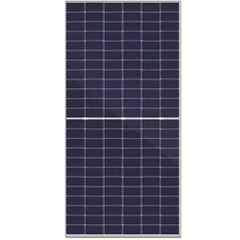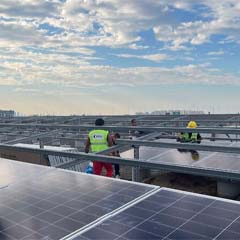How to Choose the Right Solar Panels to Meet Your Energy Needs
Dec 30, 2024
With the growing global demand for sustainable and eco-friendly energy solutions, solar power has become a leading choice. Solar panels are a symbol of the renewable energy movement, providing not only environmental benefits but also an economical way to meet your energy needs. Whether you're looking to equip your home, business, or industrial property with solar energy, understanding how to choose the right solar panels is crucial for maximizing the potential of this technology.
Solar Panels: Sustainably Harnessing the Power of the Sun
Solar energy is an infinite and environmentally friendly power source. Solar panels capture sunlight and convert it into usable electricity, providing reliable energy for homes, businesses, and industrial projects. For example, a 635 Watt Solar Panel Supplier offers high-output panels that help users make the most of their installation space efficiently.
Solar Panels Explained: Converting Sunlight into Electricity
Solar panels, or photovoltaic (PV) panels, are devices that convert sunlight into electrical energy. They are composed of solar cells made from semiconductor materials, usually silicon, which efficiently capture sunlight and convert it into usable electricity. The size, energy output, efficiency, and material type of solar panels vary, which affects their suitability for different applications. Understanding the composition of solar panels allows you to choose the right type based on your energy needs.
For example, a suburban home looking to reduce energy costs might opt for high-efficiency monocrystalline solar panels, known for their durability and higher efficiency, making them ideal for limited roof space. Meanwhile, large commercial facilities may prefer polycrystalline panels, which balance efficiency with cost.
Solar Panels: Key Factors in Choosing the Best Option
When selecting solar panels to meet your energy needs, several key factors must be considered. First, power output, measured in watts, determines how much energy a panel can produce under standard conditions. Second, the available installation space determines whether you should choose fewer, high-efficiency panels or more, less efficient ones.
Another important factor is the climate and geographical location. Areas with frequent cloud cover might require panels with better low-light performance. Additionally, consider warranties and certifications to ensure that your panels come from trusted sources. Renowned manufacturers often offer long-term warranties and international certifications, ensuring performance and reliability.
For example, in areas with abundant sunlight, a homeowner might prioritize energy output and cost by investing in high-capacity panels. Conversely, businesses in cloudy cities might focus on efficiency in low-light conditions to ensure a continuous power supply.
Choosing Solar Panels: Energy Demand and Return on Investment (ROI)
When choosing solar panels, several guiding principles can ensure the best selection. First, assess your daily energy consumption and peak sunlight hours, then calculate how many panels you need to meet this demand. Consider your existing roof structure or land availability, as it will influence the type and configuration of the panels you choose.
It is also essential to consider the long-term return on investment (ROI). High-efficiency panels may have a higher initial cost but can pay off over time by saving more energy. Working with reputable installers can also be helpful, as they offer valuable insights and often conduct audits to recommend the best installation configurations.
For instance, a university campus planning a large facility might collaborate with experts to analyze energy trends and budget constraints, ensuring the selected panels align with both short-term and long-term energy goals.
Solar Innovations: Shaping the Future of Renewable Energy
As technology advances, the future of solar panels continues to evolve. Emerging trends include the development of bifacial solar panels, which capture sunlight from both sides, increasing efficiency. The integration of smart home technologies is also gaining popularity, allowing users to monitor and optimize solar consumption via mobile apps.
Additionally, flexible solar panels and solar tiles are becoming mainstream, offering consumers more aesthetic choices without sacrificing efficiency. The growing demand for more versatile and visually appealing renewable energy solutions is driving such innovations.
Imagine a homeowner installing a solar tile system that seamlessly integrates with their roof design. Not only does it enhance curb appeal, but it also delivers robust energy output, showcasing how future solar products will meet both functional and aesthetic needs.
Choosing the right solar panels requires a careful consideration of energy needs, installation environment, and technological features. As a leading Full Black N-Type Solar Panel Company, Enecell offers high-quality all-black monocrystalline solar panels with advanced technology and superior durability. Enecell’s panels come with a 25-year power warranty, ensuring long-term reliability and maximum return on investment.



